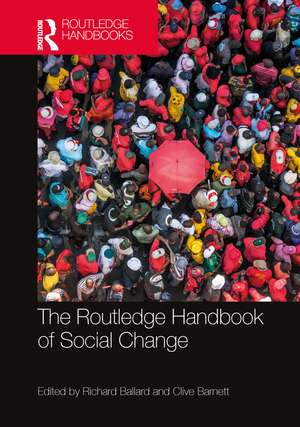The Routledge Handbook of Social Change
Autor Richard Ballarden Limba Engleză Hardback – 30 sep 2022
We live in a world of intense social transformation, economic uncertainty, cultural innovations, and political turmoil. Established understandings of issues of well-being, development, democratisation, progress, and sustainability are being rethought both in academic scholarship and through everyday practice, organisation and mobilisation. The contributors to this handbook provide state-of-the-art introductions to current thinking on central conceptual and methodological approaches to the analysis of the transformations shaping economies, polities, and societies. Topics covered include social movements, NGOs, the changing nature of the state, environmental politics, human rights, anti-globalism, pandemic emergencies, post-Brexit politics, the politics of resilience, new technologies, and the proliferation of progressive and reactionary forms of identity politics.
Drawing on disciplines including anthropology, human geography, political sociology, and development studies, this is a comprehensive and authoritative introduction to researching key issues raised by the challenge of making sense of the twenty-first century futures.
Preț: 1237.38 lei
Preț vechi: 1875.22 lei
-34% Nou
236.80€ • 244.63$ • 197.08£
Carte tipărită la comandă
Livrare economică 26 martie-09 aprilie
Specificații
ISBN-10: 0815365470
Pagini: 386
Ilustrații: 1 Tables, black and white; 3 Line drawings, black and white; 13 Halftones, black and white; 16 Illustrations, black and white
Dimensiuni: 174 x 246 x 22 mm
Greutate: 0.45 kg
Ediția:1
Editura: Taylor & Francis
Colecția Routledge
Locul publicării:Oxford, United Kingdom
Public țintă
Academic, Postgraduate, and UndergraduateRecenzii
"From activism and the anthropocene to technology and understanding power this is an extraordinary compendium of analytic writing from global contributors and a variety of time frames – with interweaving plot lines involving modes, agents and analytic approaches. And many enlightening pathways for differently minded readers to find and follow."
Ian Gordon, London School of Economics, UK.
"Ballard, Barnett and their fellow authors have done scholars of social change a great service both in synthesizing a wide range of traditions across the social sciences, and in furthering the state of the art. These essays ask where and why social change might happen, who its constituents might be, and how to recognize it without romanticizing it. Any student, indeed any practitioner, of social change will be much the wiser for reading it."
Raj Patel, The University of Texas at Austin, USA.
Cuprins
Notă biografică
Clive Barnett was Professor of Geography and Social Theory at the University of Exeter, UK. His most recent book is The priority of injustice: locating democracy in critical theory (2017).
Descriere
The Routledge Handbook of Social Change provides an interdisciplinary primer to the intellectual approaches that hold the key to understanding the complexity of social change in the twenty-first century.
We live in a world of intense social transformation, economic uncertainty, cultural innovations, and political turmoil. Established understandings of issues of well-being, development, democratisation, progress, and sustainability are being rethought both in academic scholarship and through everyday practice, organisation and mobilisation. The contributors to this handbook provide state-of-the-art introductions to current thinking on central conceptual and methodological approaches to the analysis of the transformations shaping economies, polities, and societies. Topics covered include social movements, NGOs, the changing nature of the state, environmental politics, human rights, anti-globalism, pandemic emergencies, post-Brexit politics, the politics of resilience, new technologies, and the proliferation of progressive and reactionary forms of identity politics.
Drawing on disciplines including anthropology, human geography, political sociology, and development studies, this is a comprehensive and authoritative introduction to researching key issues raised by the challenge of making sense of the twenty-first century futures.
